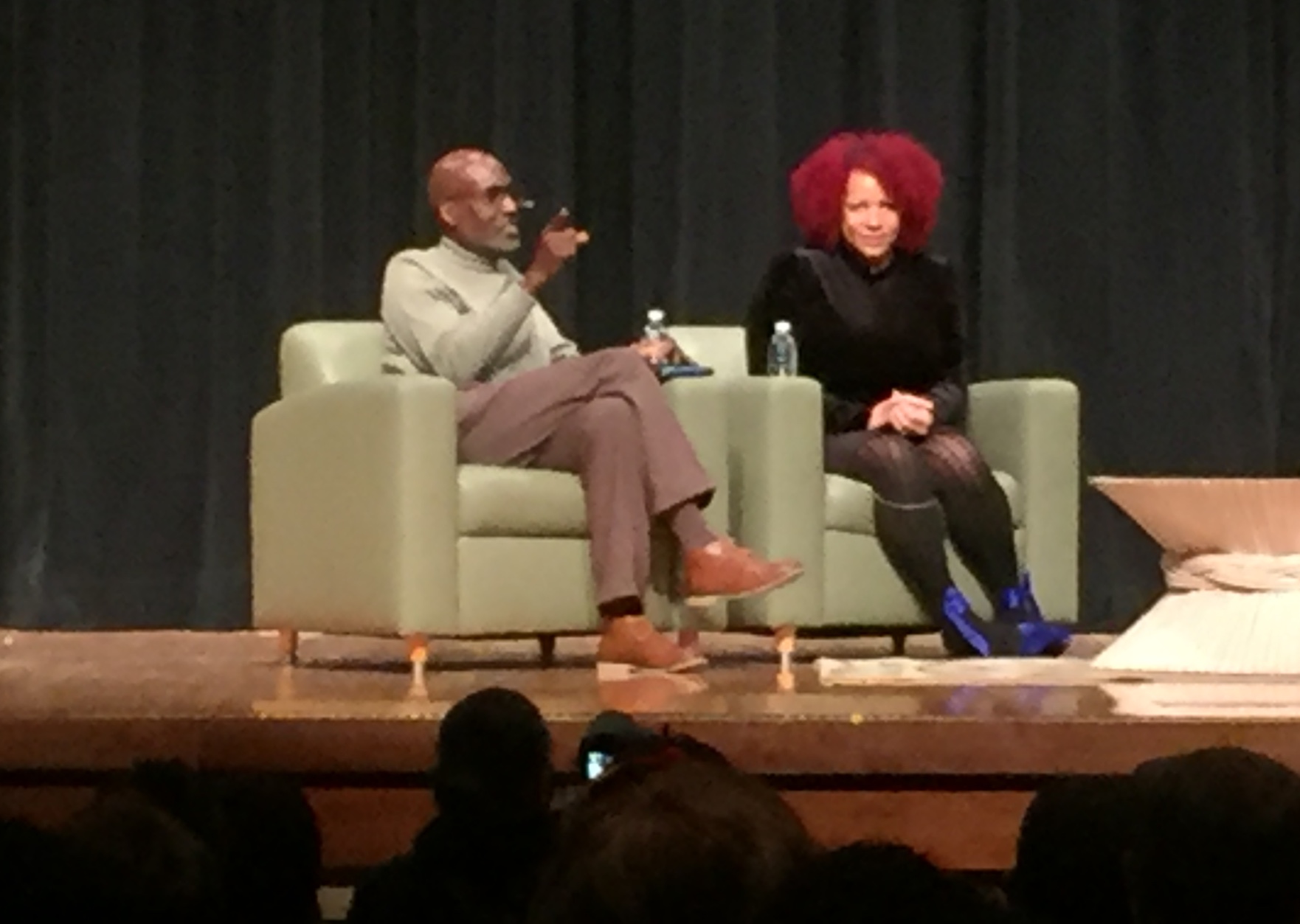This column by Daniel G. Clark first appeared in the Muscatine Journal on January 10, 2024.
I braved slick roads to attend a Martin Luther King Day celebration in Iowa City at the historic Bethel African Methodist Episcopal Church. Instead of the announced speaker, Professor Venise Berry who got stranded by weather, I got to hear a preacher whose name I didn’t know but whose face I thought I recognized.
Soon enough, I placed Orlando Ray Dial the instant he mentioned a recent communication with an unnamed (smile) Pulitzer Prize-winner former student. Of course! I had seen him on stage in Waterloo with journalist Nikole Hannah-Jones, the Iowa native now famous for creating The 1619 Project, the controversial New York Times series turned anthology, curriculum, and TV documentary.
Along with other Muscatine folks, I had attended her talk and book signing at her old high school in November 2021, my second time hearing her speak. And I had quoted her in Column 7 (March 23, 2022): “Even as a teenager, I understood that the absence of 1619 from mainstream history was intentional. People had made the choice not to teach us the significance of the year.”
So, this pastor was that social studies teacher! When she asked for more as a sophomore in his Black History class, he gave her Lerone Bennett’s book Before the Mayflower: A History of the Negro in America 1619-1962.
We had joined the cheering as they appeared together for the first time since high school.
In a 1992 column for Black History Month, Dial wrote: “The Afro-centric view is one that says Europe is not the center of the world and that the events that happened in Africa have impacted us and have a rightful place in history. It’s not an attempt to say Europe had no impact, just an effort to reach the truth.” (Waterloo Courier, February 25, 1992)
While a teacher and assistant principal, he served on the Iowa Civil Rights Commission. He became an A.M.E. minister in the early 1990s.
Last week, back home, I searched online and read about Dial and Hannah-Jones. I have read lots about the 1619 controversy and still count myself a fan of the project. That said, the most challenging find for me is an article by a French journalist, Marc Weitzmann, who attended the 2021 event and gained added perspective by interviewing Nikole’s mother, Cheryl Novotny Hannah.
“Years before it became a national holiday,” Hannah-Jones told Weitzmann, “our mother would take us to the Martin Luther King marches to commemorate King’s birthday.” Not her Black father; he preferred military history and didn’t go for King’s protests.
Nikole’s white mother happens to be my age. I can only imagine marrying a Black spouse and raising a precocious, brilliant “Afro-centric” child.
Weitzmann wrote,
But if it’s unfair to say that 15-year-old Nikole Hannah would indeed come to display the urgency of the convert, she did at least encounter a captivating evangelist. […]
It’s hard to know precisely what role Dial’s class played in the formation of Nikole Hannah’s self-understanding, or in her budding intellectual development. […]
In November 2021, when West High invited Hannah-Jones to return home and present The 1619 Project book, she not only chose him as her interlocutor for the evening, but spoke as if he was one of the main inspirations for it.
The Weitzmann piece is called “The Making of Nikole Hannah-Jones.” Check it out. Reading through my “white” eyes, it is nuanced and compelling, and I resist the temptation to dismiss it as a hack job. I’ve read lots worse takes on Iowa by writers who parachute in and then explain us.
Weitzmann: “The right-wing backlash to the project has been mostly offensive, but the long-term impact of 1619’s genuine flaws may have been more damaging than anticipated.”
Fair enough, I say. Look how 1619 has played across Iowa so far. I say time will tell. I still feel proud of Iowa’s own Nikole Hannah-Jones.
Blame Pastor Dial if you don’t like centering American history on 1619? His 2024 MLK sermon theme was “Here and Now.” We are all in the same boat now.
* * *
Muscatine Weekly Journal, April 17, 1868: “A colored Methodist Church, with 21 members, was organized at Iowa City, on the 5th, Rev. Jesse Bass, of Muscatine, officiating. Rev. P.C. Cooper is pastor in charge. A church edifice is to be built.”
* * *
For the second year since becoming a state holiday, February 1 is George Washington Carver Day in Iowa.
Muscatine observes February 25 as Alexander Clark Day since 2018 when the city council voted for the commemoration in perpetuity. The featured program of the 14th annual Alexander Clark cultural series will be Tuesday, February 27, 6 p.m. at Muscatine Community College. “Squatters on Red Earth,” a new play by Mary Swander, explores the relationship between the Meskwaki people and the communal society that founded the Amana Colonies. Put it on your calendar now!
Next time: Black History Month from Carver to Clark


2 Comments
No title
Rev. Dial was influential even going back to the eighties. His passion and organizational savvy in Blackhawk County was a major factor in Jesse Jackson’s surprisingly strong caucus showings. Forty years later he continues to teach and inspire with insightful – and often humorous – sermons at Bethel AME. Thank you Ray!
Dave Leshtz Mon 8 Jul 11:17 AM
Jesse!
Thanks, Dave Leshtz, for adding the insight about Dial’s part in Jesse Jackson’s success in Iowa. I look forward to taking in another Dial sermon at Bethel AME. ~Dan Clark
Iowapeacechief Tue 9 Jul 9:03 PM